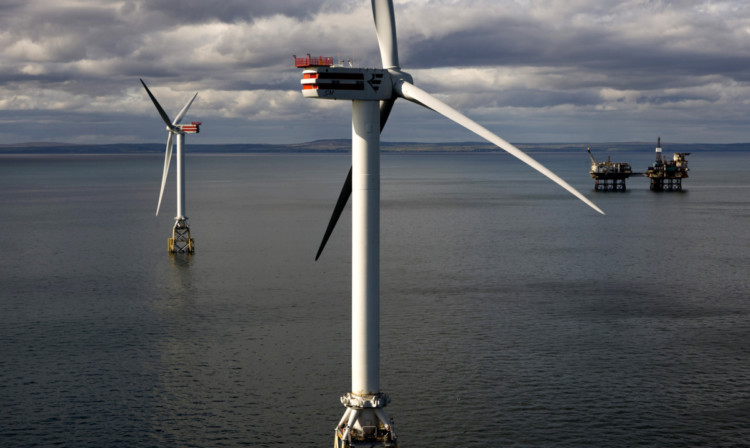Scotland’s offshore energy industry received a shot in the arm yesterday after a U-turn by the UK Government on funding for the £2 billion Beatrice wind array in the outer Moray Firth.
Perth-based majority owner SSE said it was “extremely pleased” by the decision of the Department of Energy and Climate Change (DECC) to award an investment contract to the 664MW project.
The move comes just four months after DECC announced that Beatrice and two proposed major east coast arrays – Inch Cape and Neart na Gaoithe – had been excluded from its new Final Investment Decision Enabling for Renewables (FiDeR) funding mechanism at the first stage.
The change of heart on Beatrice came as DECC yesterday announced FiDeR backing for eight major UK green energy projects. The schemes were chosen from an initial pool of 57 projects which DECC officials whittled down over the course of the past year.
SSE has a 75% stake in Beatrice with joint venture partner Repsol owning 25%, but the utility is currently looking to sell down its stake to 50% after announcing a major pull back on its green energy ambitions last month.
However, the Inveralmond-based group remains committed to taking the Beatrice project forward and yesterday welcomed the FIDeR decision but said there was still a number of hurdles for the project to clear before a final investment decision could be taken in 2016.
“In March we highlighted that we would be focussing our efforts and resources in offshore wind on the Beatrice project,” Finlay McCutcheon, SSE’s director of offshore renewables, said.
“To be able to progress any offshore wind project investors need, amongst other things, clarity over the regulatory framework.
“Securing an Investment Contract from the UK Government provides the project with this clarity and will enable further investment to continue through 2014. We are therefore extremely pleased with today’s announcement.
“However there is still significant additional work to be done before a final investment decision can be made, and we will be working closely with Repsol, and our supply chain partners, to further reduce costs and refine the development and construction programme, with the aim of delivering a viable project in early 2016.”
The Beatrice development – the only scheme in Scotland to receive FIDeR support – is to be built 11 kilometres off the Caithness coast and will form part of the world’s third-largest windfarm alongside the adjacent EDPR-owned Moray Offshore array. The twin projects – which will collectively create more than 5,000 jobs in the construction phase – received development consents from the Scottish Government last month.
Energy Secretary Ed Davey said the awarding of the Investment Contracts was a milestone moment for the UK clean power sector.
“These contracts for major renewable electricity projects mark a new stage in Britain’s green energy investment boom,” Mr Davey said.
“By themselves they will bring green jobs and growth across the UK, but they are a significant part of our efforts to give Britain cleaner and more secure energy.
“These are the first investments from our reforms to build the world’s first low carbon electricity market reforms which will see competition and markets attract tens of billions of pounds of vital energy investment whilst reducing the costs of clean energy to consumers.”
Lindsay Leask, senior policy manager at industry body Scottish Renewables, said the award of the Investment Contract was exactly the type of financial certainty the industry had been looking for.
“With our huge offshore wind resource, it is not unrealistic to expect to see a number of Scottish offshore wind projects receive planning consent and secure financial support by the end of the year,” she said.
“This decision will help kick-start the offshore wind sector in Scotland, which has the potential to provide thousands of jobs and billions of pounds of inward investment to our country, while also making a significant contribution to Scotland’s ambitious 2020 renewable energy targets.”
Maf Smith, deputy chief executive of trade association RenewableUK said the new contracts represented progress but said there was still a significant way to go to secure the UK’s energy supply.
“We need far more onshore and offshore wind projects over the next decade if we’re not to find our energy security threatened, and the UK further exposed to price shocks from imported fossil fuels, so it’s important that the Contracts for Difference regime works for all renewable energy projects, not just those that have secured early contracts.”
